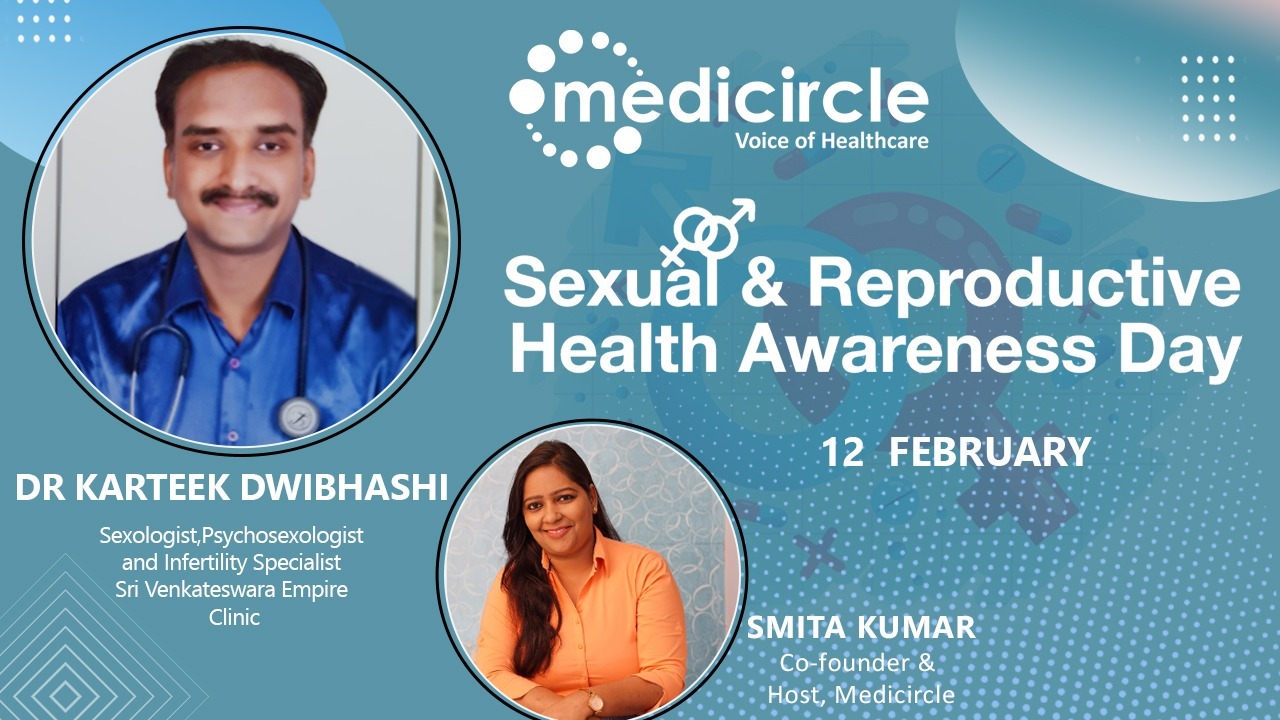Good sexual and reproductive health is a state of complete physical, mental and social well-being. Access to a clear, advice and information on sexual health is crucial, as is being able to choose from a range of contraceptive options without facing any stigma or discrimination. Despite clear reasons for necessity of sexual health awareness among people, it is contested issue and has faced challenges. At Medicircle, we are conducting an exclusive interview series on “Sexual Health and Awareness Day”, showcasing eminent sexologist and sexual health educators over a discussion to bring awareness about sexual and reproductive health issues.
Dr. Karteek is an experienced Sexologist, Psycho-sexologist and Infertility Specialist currently practicing in Sri Venkateshwara Empire Clinic, Andhra Pradesh. He is the member of council of sex education and parenthood and a professional member of International Forensic Sciences. He is also a Hypnotherapist and an Occupational Health Specialist.
Ways to Improve Reproductive Health
“Reproductive health implies safe sex life and capability to reproduce and is very important for both males and females” says Dr. Dwibhashi. Here are some ways to improve reproductive health:
“Sexual Exercises - This include stop and start technique. Every time when you feel an ejaculation, you have to stop immediately, take a deep breath and then once again you must start pace but with less pressure, keep repeating the process till you reach the climax. So, this pattern will solve the problem of erectile dysfunction.
Masturbation - It is important twice weekly and is sufficient for age group of 20 to 32 years. If it is more than two session, it will lead to hyper and hypo sexual activity disorder. People are facing problem because they are doing more frequently rather than prescribed by the sexual counsellor.
Workouts – Elbow Planks, Superman Stretches, Jump Squats and Kegels (control the pelvic muscle strength), Push-ups, Tongue Pullback and Tongue Push-ups, these are some of the exercises which helps to improve sexual health.
Diets – Having protein rich diet such as nuts, tofu, eggs, clean red meat, poultry and fish, yogurt, cheese and milk help in increasing stamina by providing long lasting energy. Food you eat should be rich in Vitamin-D, Calcium, Magnesium, Fibres, Potassium, Capsaicin etc.
Anxiety and Stress - Anxiety and stress makes it difficult to bond or maintain a connection both for males and females. We can measure stress values, by doing the test of cortisol. Psychosexuality focuses on physical sensation than sexual performance, exercising, getting more sleep (healthy sleep), meditating, spending time together on a favourite hobby etc.
Open Communication – It is the best thing to do. We do CBT wherein their likes and dislikes are being asked, what they want from each other. After understanding it, they develop physical and emotional bond which is very much important for marital life.
Sexual Pleasure Trials - It is been observed that after some years of marriage, one start losing interest, excitement in partner. So, to protect sacred marital life, one can start doing activities such as cooking together, going to a museum, seeing a brand-new sport, watching movies together which restores all your old memories and develop emotional bond” says Dr. Dwibhashi.
Stop being Parent and Try to Become Friends
According to Dr. Dwibhashi “Children are exposed to information about sex from sources such as school friends, social media at much early age than many parents expects. Parents themselves are very much shy to talk to their children. It’s a taboo in Indian society to talk to them regarding sex. They hesitate in talking to them and even don’t know how to talk & what to talk, what is the correct language to use and how much to convey. Talking about these topics causes discomfort, embarrassment to parent as well as to children. Parents should also put their efforts to create awareness regarding sex education and should not just rely on schools”.
“Revealing too much information is also not good. So, depending upon their age in which category they fall, should be discussed as per it. Start talking to your child when they are young. They must adhere to the Indian culture and values. Ethics and moral science should get imbibed by themselves. Some schools also provide sex education in the class of 8 – 10 while it should be from 5 – 6 standards. Communication between parents and children, sexual orientation can resolve many problems” emphasises Dr. Dwibhashi.
Measures to control Sexually Transmitted Diseases (STD's)
STD are infections that are passed from one person to others through sexual contacts. The contact is usually vaginal, oral and anal. But sometimes they may spread through intimate physical contact. Dr. Dwibhashi listed out some measures, how STDs can be avoided:
Use of condom – One should always use protection while having sexual activity. Have fewer partners – One should indulge only with one partner. Get HPV vaccination – Children should be vaccinated against this at the age of 11-12. Testing for STD's – Anyone who is more active or having multiple partners should get tested more frequently so that they can get treated at right time, if found positive.
(Edited by Renu Gupta)

 “Eight hours of healthy sleep is necessary to improve our sexual and reproductive health†says Dr. Dwibhashi Karteek, Sexologist.
“Eight hours of healthy sleep is necessary to improve our sexual and reproductive health†says Dr. Dwibhashi Karteek, Sexologist.






.jpeg)





.jpg)







.jpeg)





.jpg)




.png)



